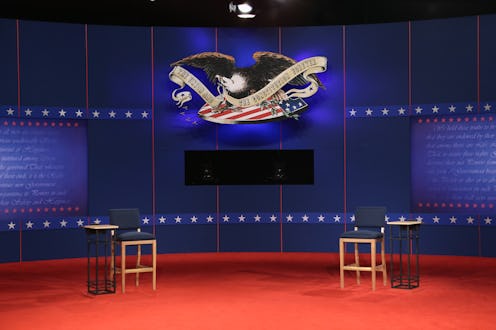News
The Presidential Debate Is All About Expectations
It has been 549 days since the first candidate in the 2016 race announced he was running, and we are finally, finally about to have the first General Election Debate at Hofstra University between Democratic presidential candidate Hillary Clinton and Republican presidential candidate Donald Trump. It sort of feels like Christmas is finally here, except nobody gets any presents and there's a serious chance that a man who insults Gold Star families and Vietnam War POW's might become our nation's leader.
Whether you’re having a debate-watching party (and managing the stress with drink) or hiding under the covers with one eye peeking at the screen, if you want to understand not only how the candidates are performing, but how they’ll be evaluated (both by voters and the media) you have to look at the debate through the lens of the Expectation Game.
Like so much of my political science theory, I first encountered this idea on The West Wing, when Press Secretary CJ Cregg worries that because their candidate, President Bartlet, is considered “smart” and his opponent is considered “folksy” and “simple” that the only way Bartlet could win the debate would be if his “opponent accidentally lights his podium on fire.” (If you have Netflix, the clip is in Season 4, Episode 4 at 7:16.)
To put it more simply: when I went to see the Michael Bay film Pain & Gain, it had gotten such awful reviews (the A.V. Club gave it a “D”) that when it turned out to be not actually all that bad, and kind of fun (I mean, it stars The Rock), I enjoyed it a lot more than I would have if my expectations hadn’t been so low.
The expectations game for Trump and Clinton is a little more complex, mostly because voters view both of them so negatively; because of this established unfavorable standing, they will be working against those expectations. For Trump, this means looking out for whether he says anything racist, sexist, Islamophobic, or anti-immigrant. Well, let me rephrase: whether he says anything egregiously racist, sexist, Islamophobic or anti-immigrant. Because he’s already set the public’s tolerance fairly high for gross statements, he’ll have to say something pretty bad to get punished for it.
Clinton’s negatives have more to do with her perceived inability to connect with voters on camera, and the idea of her as an opportunistic politico willing to change her deeply held beliefs with the prevailing winds. If she’s able to have an emotional moment, like she did in New Hampshire in 2008 (not necessarily crying, but at least authentically connecting), it could be a big win for her.
Of course, people also don’t trust Clinton, whether because of the email server debacle, her perceived lack of health transparency, or general media opaqueness; as John Dickerson rightly observed in the Slate Political Gabfest, if she’s seen as flip-flopping or hedging on anything (as she was in the 2008 primary debates) it could spell bad news for her and her campaign.
There will be other things to watch out for, for sure — for instance, which candidate gives the juiciest sound-bite that the networks will play over and over — but when it comes down to who comes out on top, the Expectations Game is where it’s at.
